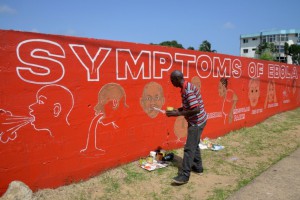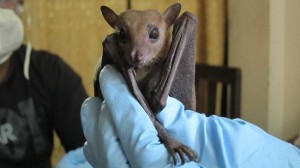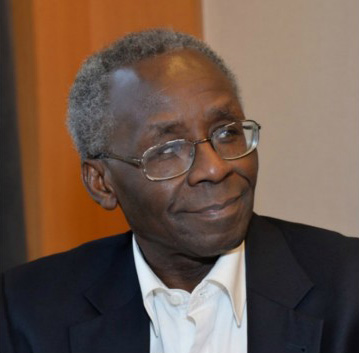Exhibit Case 1: Ebola in West Africa
Case 1 provides information on Africa’s response to the ongoing Ebola outbreak in West Africa. Click on an image to be taken either to the item in our catalog or to a website for Internet items.
 Poster Campaign on Information to Prevent Ebola, created by the Ugandan Ministry of Health. In November 2012, the government of Uganda reported an outbreak of Ebola in Luweero and Kampala. This poster was part of the government initiative to educate the Ugandan people on how to handle the outbreak. |
 Coker, Syl-Cheney. Stone Child and Other Poems. Ibadan: HEBN Publishers, 2008. The text of Coker’s poem “The Nobel Tree Woman and an Elegy for the Ebola Saint” is also on display. |
 Freedom du Lac, J. “This is How People are being Warned about the Ebola Epidemic in West Africa.” Washington Post 10 Sep. 2014. “Artist Stephen Doe paints an educational mural to inform people about the symptoms of Ebola in Monrovia, the capital city of Liberia. The photo was taken Sept. 8. (Ahmed Jallanzo/European Pressphoto Agency).” |
 Doucleff, Michaeleen. “Where Could Ebola Strike Next? Scientists Hunt Virus in Asia.” Morning Edition. National Public Radio. 2 Jan. 2015. Web. “Ecologists found signs of Ebola in a Rousettus leschenaultii fruit bat. These bats are widespread across south Asia, from India to China.” |
 Hewlett, Barry S. Ebola, Culture, and Politics: the Anthropology of an Emerging Disease. Belmont, CA: Thomson, 2008. |
“In this case study, readers will embark on an improbable journey through the heart of Africa to discover how indigenous people cope with the rapid-killing Ebola virus. The Hewletts are the first anthropologists ever invited by the World Health Organization to join a medical intervention team and assist in efforts to control an Ebola outbreak. Their account addresses political, structural, psychological, and cultural factors, along with conventional intervention protocols as problematic to achieving medical objectives. They find obvious historical and cultural answers to otherwise-puzzling questions about why village people often flee, refuse to cooperate, and sometimes physically attack members of intervention teams. Perhaps surprisingly, readers will discover how some cultural practices of local people are helpful and should be incorporated into control procedures.” – John A. Young, Series Editor |
 Davies, Desmond. “Ebola and the Failure of Governance.”
New African Oct. 2014: 32-35. |
 Wallis, William. “Nigeria: Ebola Ne Passera Pas Par La.”
Jeune Afrique 19-25 Oct. 2014: 10-12. |
Q: You said in your talk that Ebola was “swimming in an ocean of national apathy, denial, and unpreparedness.” What did you mean?
A: We were totally unprepared. After the first cases occurred in West Africa, it took almost 3 months for WHO to know. When the first patient came to Sierra Leone and died, his son brought him back to Guinea and as far as Sierra Leone was concerned, it was Guinea’s problem. People abandoned their duty, they denied the problem, and when it became a big problem they became incapable of handling it.
This is not the first time Ebola has appeared in Africa. There have been more than 20 outbreaks since 1976. Not one of them has been declared a global problem. Of course, circumstances are different this time. But if we had been prepared, if we had learned from the past, we wouldn’t be where we are today.
|










